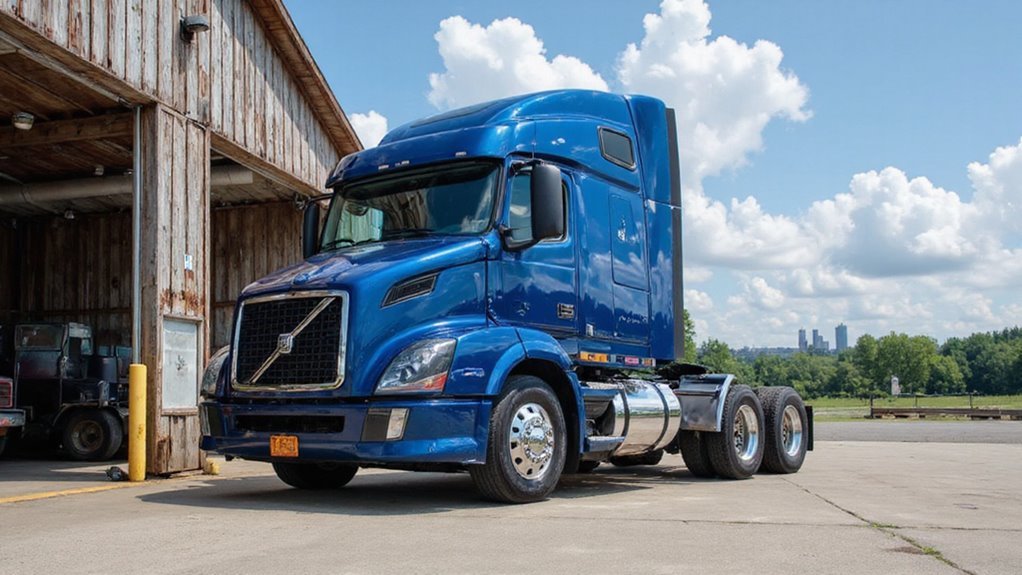If you’re new in commercial truck financing with fresh carrier authority, your credit score around 600–700 helps—but don’t sweat if this score is lower; bigger down payments can sweeten the deal. Make sure your business docs like tax returns, registration, and financials are ready to impress lenders who love organized paperwork. Decide between buying, leasing, or lease-to-own based upon budget and goals. Market shifts and new rules mean smart planning pays off. Stick around and you’ll find out how for steer through these steps smoothly!
Key Takeaways
- First-time commercial truck financing requires a credit score typically between 600 and 700 and solid business financial documentation.
- Prepare essential documents including business license, tax returns, bank statements, and proof of legal operation for faster approval.
- Larger down payments (10%-25%) improve financing terms, especially if credit history or business age is limited.
- New carriers must verify business authority with MC and DOT numbers along with insurance and registration paperwork.
- Consider leasing, loan, or lease-to-own options, factoringSelling accounts receivable (invoices) to a third party at a in monthly payments, truck age, and long-term cash flowThe net amount of cash moving in and out of a business. planning.
Understanding Credit Score Requirements for Commercial Truck Financing

When you’re exploring the domain of commercial truck financing, your credit score quickly becomes the star of the show. In fact, meeting the requirements for initial commercial truck financing often means having a credit score between 600 and 700. If yours is at the lower side, don’t panic—some lenders get creative and offer flexible deals, though usually with a bigger down payment. Many lenders also consider business financials such as cash flowThe net amount of cash moving in and out of a business., annual revenue, and time in business when evaluating commercial truck loan applications. Lenders also pay close attention to credit history, as a poor credit history can impact financing approval and terms. A better credit score reveals lower interest rates and friendlier repayment terms, making your initial truck purchase smoother than a fresh asphalt highway. So, focus on improving your credit by paying down debts and double-checking your credit report. Think of your credit score like a GPS: it guides lenders in trusting you to steer your business toward success. And hey, who said financing has to be all business and no fun?
Importance of Business Documentation for Loan Approval
When you’re applying for a commercial truck loan, your paperwork isn’t just a boring checklist—it’s your secret weapon. Lenders want to see solid financial documents, proof that your business and truck are the real deal, and a clear depiction that you’re ready to handle the road ahead. Nail these, and you’ll turn “maybe” into “approved” more quickly than you can say, “full throttle!” Providing a business license and registration is essential as it confirms your legal operation status, which reassures lenders of your legitimacy. Having thorough documentation also helps demonstrate your creditworthiness and ability to repay, which is critical in obtaining financing for commercial trucks.
Essential Financial Documents
Although securing financing might feel like an intimidating maze, having your vital financial documents in order can turn that maze into a straightforward path. Think of key financial documents—like your tax returns, bank statements, business registration, and credit reports—as your roadmap. When you gather these up front, you accelerate approval velocity and keep lenders from playing hide-and-seek with your paperwork. Don’t forget your business plan and employer identification number, which show you’re serious and organized. Missing a document can slow things down, like a flat tire on the highway. For loans exceeding $150,000, be prepared to provide additional financial documents, which can be crucial for smooth loan approval. Keeping everything neat and ready not only enhances your confidence but signals to lenders you’ve got your act together. This process is all about making their job easier so they can say “yes” more quickly—and get you trucking in no time.
Vehicle and Business Verification
Securing commercial truck financing isn’t just about showing you can pay back a loan—it’s about proving you’re running a legit business that lenders can trust. That means nail down your business history clearly and have rock-solid verification of legal operating authority, like your MC and DOT numbers. Lenders want to see you’re legally cleared to haul freight, so don’t skip your business registration, EIN, or insurance docs. Think of that as your business’s digital handshake—it builds instant trust. Missing or sloppy paperwork? That’s like showing up to a high-tech pitch with flip charts—outdated and risky. Providing necessary documentation such as bank statements and tax returns also plays a critical role in securing approval. By providing complete, accurate documents, you speed up approval and might even snag better loan terms. So get these crucial elements locked down; it’s your ticket to innovation in the road and financial success.
Impact of Documentation Quality
Because lenders rely heavily regarding paperwork for sizing up your business, the quality in your documentation can make or break your loan approval. When you nail documentation quality and meet clear application requirements, you show you’re serious and organized—a big win in their eyes. Sloppy or missing documents? That’s like showing up for a pitch with your shoelaces untied—forgettable and risky. It is essential to prepare a solid business plan outlining your revenue generation strategy to strengthen your application business viability.
Here’s a quick snapshot concerning what counts:
| Document Type | Purpose | Benefit |
|---|---|---|
| Business Licenses | Legal operation verification | Builds lender trust |
| Financial Statements | Income & cash flowThe net amount of cash moving in and out of a business. proof | Shows repayment ability |
| MC & DOT Numbers | Regulatory compliance | Confirms operation legitimacy |
| Tax Returns | Income history | Verifies stability |
| Documents of Incorporation | Business structure | Proves liability protection |
Smart documentation opens doors—and lowers costs. So, don’t get caught with your paperwork down!
Different Types of Commercial Truck Financing Options
When you consider getting your initial commercial truck, you’ll need to weigh the perks of loans versus leasing—you know, owning outright or renting with options. Then, there are alternative financing models that mix things up, like lease-to-own, which lets you test the waters before fully jumping in. Choosing the right path can feel like picking toppings on a pizza—each one changes the flavor, so let’s investigate what fits your business appetite best. It’s important to compare top financing options to ensure you select the best fit for your new carrier authority.
Loan Vs Leasing
Although both loans and leases get you behind the wheel from a commercial truck, they come with very different strings attached. Loan terms usually mean you’re locked in for 4–5 years, paying off your asset and building equity—your truck becomes yours, no ifs, ands, or buts. Leasing, in contrast, feels lighter on upfront cash and offers flexibility with shorter terms, perfect if you love upgrading with the latest models. But remember, leasing means no ownership and often mileage limits, so you’re kind of borrowing freedom, not the truck itself. Loans bring higher initial costs and maintenance responsibility, while leasing can package maintenance but might pinch your long-term budget. So, which side are you leaning toward—building a legacy or renting the ride? Both can fuel your innovative expedition.
Alternative Financing Models
Steering through the domain of commercial truck financing can feel a bit like trying to pick the best rig at a truck show—there are plenty of options, each with its own perks and quirks. When this comes to commercial truck financing for new authority, alternative lending and lease structures open exciting avenues beyond traditional loans. You can investigate TRAC and FMV leases, which offer tax perks and flexibility, or installment leases that spread out payments while letting you claim depreciationAllocating the cost of a tangible asset over its useful life benefits. Maybe you want equipment leases for non-titled gear, keeping your cash flowThe net amount of cash moving in and out of a business. intact while upgrading tech. These models aren’t one-size-fits-all, but they let you customize how you grow your fleet, keep expenses in check, and stay ahead in a business that rewards innovation and smart moves.
How Down Payments Affect Financing Terms
If you want to get the best deal for your commercial truck loan, your down payment plays a much bigger role than you might expect. Putting down more upfront not only shows lenders you’re serious but can also lower your interest rates, making monthly payments easier for your wallet. Think about it like a handshake—with a bigger down payment, lenders feel safer, and you get smoother terms. New trucks might need as little as 10%-15% down, while used ones usually ask for more. If your credit isn’t perfect, a heftier down payment can tip the scales in your favor. So, while saving that cash can be tough, this is a smart move; this resembles catching an early freight train for better financing. Additionally, securing truck financing with challenging credit history often requires demonstrating financial responsibility, which a larger down payment can effectively provide.
Comparing Leasing and Lease-to-Own Models

When you’re deciding how obtaining the wheel of your primary commercial truck, leasing and lease-to-own can seem like twins—similar at a glance but very different once you look closer. For initial time commercial truck financing, choosing between these models shapes your business path. Leasing keeps monthly payments lower and lets you upgrade gear easily, but you build no equity. Lease-to-own means paying more each month, but you’re investing in ownership—your truck becomes an asset once you finish payments.
Here’s the scoop:
- Leasing shifts depreciationAllocating the cost of a tangible asset over its useful life risk; lease-to-own keeps it with you
- Lease payments might cover maintenance; lease-to-own usually doesn’t
- Lease-to-own locks you in; leasing offers flexibility
- You own the truck only after lease-to-own’s final payment
- Lease-to-own builds long-term value; leasing suits short-term needs
Pick what powers your growth best! Keep in mind that operating leases, a flexible financing option, are growing rapidly due to their adaptability for commercial vehicle users.
Typical Costs and Monthly Payment Expectations
Now that you’ve weighed the pros and cons pertaining to leasing versus lease-to-own, it is the time for getting into the nitty-gritty concerning what your wallet might actually face: the typical costs and monthly payments. Expect down payment requirements to hover between 10% and 25% from your truck’s price—so a $100,000 rig might need $10,000 to $25,000 upfront. Monthly payment expectations vary with loan term and interest rates, but for something around $85,000 over four years, you’re looking at about $1,750 a month. Keep in mind, longer terms may shrink monthly bills but hike total interest. Knowing these numbers upfront saves those “surprise expenses” moments and helps you plan like a pro ready to innovate, rather than a rookie stuck guessing. Securing financing for commercial vehicles often involves understanding and negotiating the terms that best fit your business goals, which can be found in detail within securing financing guides.
Navigating the Application and Approval Process
Before you hit “submit” for your loan application, make sure your documents are organized and ready to impress—it is like showing up for an interview dressed to win. Taking advantage of digital applications can speed up the process, so don’t be surprised if you get a loan decision before you’ve finished your coffee. Remember, approval times can vary depending upon your paperwork and lender, so stay patient and keep your phone nearby—you might get a call before you know it. Understanding the differences between loans and leases can help you choose the best financing option for your new commercial truck.
Document Preparation Tips
Even though gathering all your paperwork might not sound as thrilling as ultimately selecting your truck, getting your documents in order is one among the smartest moves you can make prior to applying for financing. Being atop the document preparation tips will accelerate the application process and show lenders you mean business. Here’s your checklist to keep things smooth:
- Valid CDL and government-issued photo ID
- Business registration and your EIN
- Up-to-date credit report and bank statements
- Proof of residence like a utility bill
- Vehicle details: bill of sale, insurance, and dealer invoice
Staying organized isn’t glamorous, but it grants quicker approvals—because even in trucking, paperwork rules!
Digital Application Advantages
Applying for commercial truck financing used to mean stacks in paperwork, long waits, and feeling like you were stuck in a never-ending line at the DMV. Luckily, initial time commercial truck financing has leveled up with digital applications. Now, you can apply anytime from your phone or laptop in just minutes—no printing or mailing needed. The rapid approval process kicks in immediately with instant credit checks and mechanized underwriting, so you’re not stuck twiddling your thumbs. Additionally, you get real-time updates and can track your app’s progress online, making the whole expedition transparent and way less stressful. Uploading documents? Just snap and submit securely—no more lost papers. This digital revolution isn’t just quicker; it’s smarter, giving you flexibility to tailor terms and compare lenders all from one location.
Approval Timeline Factors
Since every lender plays by slightly different rules, the timeline for getting your commercial truck loan approved can feel a bit like waiting for a pot with water to boil—sometimes quick, sometimes slow, and occasionally unpredictable. Understanding approval timeline factors helps you steer how to get initial commercial truck financing without unnecessary headaches. Your credit score, business age, and truck condition can speed things up or slow them down. Also, how well you prepare your documents and cash flowThe net amount of cash moving in and out of a business. details matters a lot. Different lenders, from banks to online platforms, offer varying speeds and requirements, so choose wisely.
Here are the top factors influencing your approval timeline:
- Credit score and business history
- Quality and age of the truck
- Accuracy and completeness of paperwork
- Proof of steady cash flowThe net amount of cash moving in and out of a business.
- Lender’s processing speed and loan type
Financing Considerations for New Carrier Operators

What should you really know before entering into commercial truck financing as a new carrier operator? Initially, understand that financing for new businesses like yours isn’t just about getting a loan; it’s about building a foundation. With initial time owner operator truck financing, lenders often want a business history—even if brief—and a credit score above 600 helps. But don’t panic if you’re just starting; some lenders offer flexible down payments, even $0 down in rare cases. You’ll want to weigh leasing versus buying, considering monthly payments and truck age. Keep in mind, a solid business structure and clean financial records enhance your chances. So, get your paperwork ready, plan your cash flowThe net amount of cash moving in and out of a business. wisely, and tackle financing like the savvy innovator you are—because your primary truck is your ticket to freedom!
Market and Regulatory Trends Impacting Truck Financing in 2025
Even though trucking has long been a backbone of commerce, the market and regulatory environment in 2025 are throwing some new curveballs that could make financing your initial rig a bit more interesting—and a little trickier. You’ll traverse market softness and regulatory uncertainty that impact loan costs, fleet choices, and timing.
Here’s what might stand out for you:
- High interest rates push up your loan costs, making that dream rig pricier.
- Unpredictable freight demand means tight cash flow—plan for the bumps.
- New emissions rules create “green” opportunities but also more questions.
- Subsidies for electric trucks could lower your financing costs if you go green.
- Used trucks are staying in fleets longer, tightening options for fresh gear.
Staying savvy here means you’re not just rolling the dice—you’re playing to win.
Strategies for Managing Total Cost of Ownership
When you’re preparing for acquiring your initial truck, managing the overall cost of ownership might not be the most thrilling subject, but it’s absolutely vital for keeping your enterprise afloat—and your wallet content. To master the total cost of ownership, concentrate on smart purchase decisions: look for deals, factor in licensing, and don’t forget pre-delivery inspections. Fuel and maintenance costs can sneak up—invest in fuel-efficient tech, plan routes, and keep that maintenance schedule tight to avoid surprise breakdowns. Even if you’re eyeing initial time commercial truck financing no money down, be ready for operational expenses like insurance and tolls. Managing every penny is like tuning your rig; do it right, and your business will cruise smoothly without blowing the budget.






